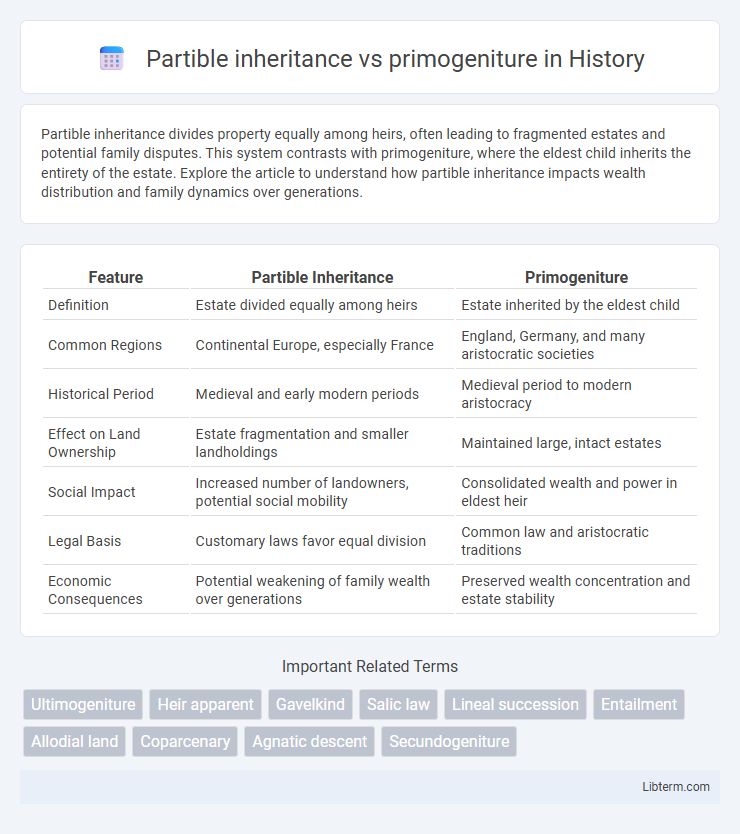Partible inheritance divides property equally among heirs, often leading to fragmented estates and potential family disputes. This system contrasts with primogeniture, where the eldest child inherits the entirety of the estate. Explore the article to understand how partible inheritance impacts wealth distribution and family dynamics over generations.
Table of Comparison
| Feature | Partible Inheritance | Primogeniture |
|---|---|---|
| Definition | Estate divided equally among heirs | Estate inherited by the eldest child |
| Common Regions | Continental Europe, especially France | England, Germany, and many aristocratic societies |
| Historical Period | Medieval and early modern periods | Medieval period to modern aristocracy |
| Effect on Land Ownership | Estate fragmentation and smaller landholdings | Maintained large, intact estates |
| Social Impact | Increased number of landowners, potential social mobility | Consolidated wealth and power in eldest heir |
| Legal Basis | Customary laws favor equal division | Common law and aristocratic traditions |
| Economic Consequences | Potential weakening of family wealth over generations | Preserved wealth concentration and estate stability |
Introduction to Inheritance Systems
Inheritance systems govern the distribution of assets and titles from one generation to the next, with partible inheritance dividing property equally among heirs and primogeniture granting inheritance exclusively to the firstborn child. Partible inheritance encourages fragmentation of estates, impacting social and economic structures by promoting egalitarian distribution but potentially weakening family wealth. Primogeniture consolidates wealth and power within a single heir, often preserving large estates and maintaining aristocratic or familial influence over time.
Defining Partible Inheritance
Partible inheritance is a system where a deceased person's estate is divided equally among all heirs, often leading to the fragmentation of land holdings over generations. This contrasts with primogeniture, where the entire estate is inherited by the eldest son, preserving the estate's integrity. Partible inheritance is historically significant in many societies for promoting equity among offspring but can result in reduced land efficiency and economic power.
Understanding Primogeniture
Primogeniture is a hereditary succession system where the eldest child, typically the firstborn son, inherits the entire estate or title, preserving family wealth and power in a single line. This method contrasts with partible inheritance, where assets are divided among all heirs, often leading to fragmentation of property and diminished influence. Historically, primogeniture stabilized property ownership and social hierarchies by preventing the subdivision of land and ensuring continuity of estates across generations.
Historical Origins of Both Systems
Partible inheritance originated in ancient Germanic and Celtic societies where land was divided equally among all heirs to maintain family status and prevent conflicts. Primogeniture developed primarily in medieval Europe, notably under Norman influence, granting the entire estate to the eldest son to preserve estate integrity and political power. These distinct systems reflect differing societal values: egalitarian resource distribution versus centralized wealth and authority consolidation.
Geographic Distribution and Cultural Variations
Partible inheritance, commonly practiced in regions such as parts of France, Germany, and India, involves dividing property equally among heirs, reflecting cultural values of fairness and collective family wealth. Primogeniture, prevalent in England, Japan, and many aristocratic European societies, assigns inheritance to the eldest son to maintain estate integrity and social hierarchy. Geographic distribution of these practices aligns with varied legal traditions and socio-economic structures, influencing land ownership patterns and familial roles across cultures.
Social and Economic Impacts
Partible inheritance, where property is divided equally among heirs, often leads to land fragmentation, reducing agricultural efficiency and weakening family wealth accumulation, which can hinder economic growth in agrarian societies. Primogeniture consolidates estates under a single heir, maintaining large, economically viable landholdings that support sustained wealth and social status, but may limit opportunities for younger siblings and concentrate power. These inheritance systems shape social hierarchies and economic structures by influencing land distribution, wealth consolidation, and familial stability across generations.
Effects on Land Ownership and Fragmentation
Partible inheritance often leads to significant land fragmentation as property is divided equally among heirs, resulting in smaller and more numerous land parcels over generations. Primogeniture, by design, consolidates land ownership under a single heir, maintaining estate size and preventing fragmentation, which supports economic stability and easier management. These inheritance systems profoundly impact agricultural productivity, social hierarchies, and rural land markets due to their contrasting effects on land continuity and division.
Influence on Family Dynamics and Succession
Partible inheritance divides property equally among heirs, often leading to fragmented estates and potential disputes among siblings, which can strain family relationships and complicate succession planning. Primogeniture grants the entire estate to the eldest child, typically preserving estate integrity and simplifying succession but sometimes causing resentment or marginalization of younger siblings. These inheritance systems profoundly shape family dynamics by influencing the distribution of wealth, power balances, and long-term stability in lineage continuity.
Legal Reforms and Modern Trends
Legal reforms in inheritance laws increasingly favor partible inheritance, promoting equitable distribution of assets among all heirs to prevent concentration of wealth and social inequality. Modern trends show many jurisdictions abandoning strict primogeniture, reflecting changing societal values towards gender equality and family dynamics. These shifts support greater social cohesion and economic diversification by enabling wider access to property ownership.
Comparing Advantages and Disadvantages
Partible inheritance divides property among all heirs, promoting family equity but risking estate fragmentation and diminished wealth. Primogeniture concentrates assets with the eldest heir, preserving estate integrity and political power but potentially causing sibling rivalry and disenfranchisement. Economically, partible inheritance supports broader wealth distribution, while primogeniture sustains estate value and social hierarchy.
Partible inheritance Infographic

 libterm.com
libterm.com